Statesman exclusive: Gift of a kidney launches new Austin transplant program
"It's gorgeous," says Dr. Nicole Turgeon, the division chief of transplant surgery and the director of the new Adult Abdominal Transplant Center at Dell Seton Medical Center. She is looking at Victoria Threadgould's left kidney, which is on a table in front of her in Dell Seton's operating room No. 14.
Last Thursday, Threadgould became the new Adult Abdominal Transplant Center's second kidney donor, but its first one to give a nondirected gift through the National Kidney Registry. Nondirected means that Threadgould did not know the person who would get the kidney.
Two days earlier, the center did its first living donor retrieval and transplant when Kayla Wright, 33, gave a kidney to her cousin Dom Rainelli, 23. In that scenario, the donor knew the recipient.
The center — which is a partnership between Ascension Seton, the parent company of the hospital, and UT Health Austin, the clinical practice of Dell Medical School — began officially in November.
It has been two years in the making. Turgeon arrived in October 2019 to start the kidney transplant programs at Dell Seton and Dell Children's Medical Center and expected to begin the adult transplants in spring of 2020, but COVID-19 slowed down hiring and turned attention elsewhere.
For the program, Dell Seton has hired 15 people across disciplines, including administration, social workers, quality control and surgeons.
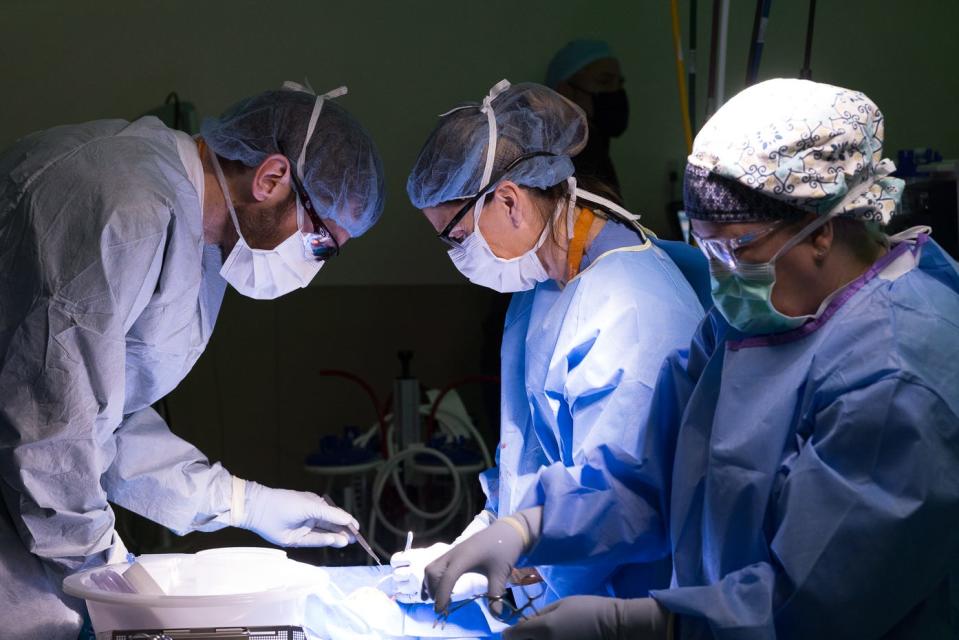
The launch of this program means that Austin now has two centers for kidney transplants, and Dell Seton's center plans to bring pancreas transplants to Austin within a year and liver transplants in three to five years. In April it expects to start pediatric kidney transplants at Dell Children's, as well. Currently, patients who need liver, pancreas or pediatric kidney transplants travel to San Antonio, Houston or Dallas for care.
The other kidney transplant center, St. David's North Austin Medical Center, has been slowly expanding since it began in 1996. It has grown the program from 20 to 30 transplants a year to about 75 a year. It is on a path to reach 150 a year.
Dell Seton's program expects to do 15 to 20 kidney transplants the first year and then grow to 75 transplants a year within five years and to 150 within 10 years. Currently, it has 14 people who are on the waiting list, six of whom are ready for a kidney offer. It's had 198 recipient referrals and 18 donor referrals.
It's growing faster than expected, said Turgeon, who had been doing transplants at Emory Transplant Center at Emory University since 2005.
More care: Dell Seton starts kidney transplant program; pancreas and liver in the works
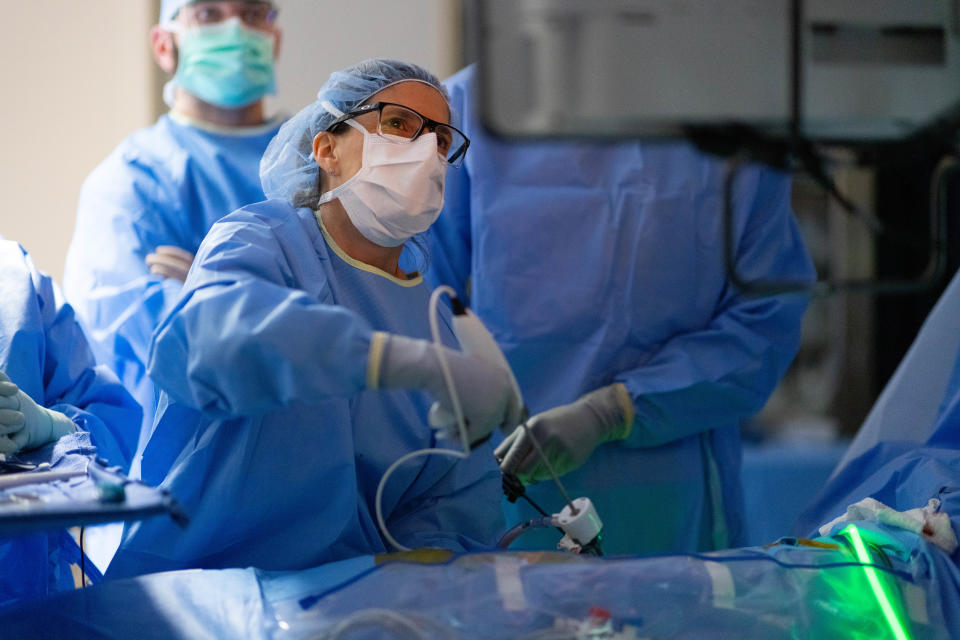
One gift, many people helped
Threadgould had decided to donate a nondirected kidney through the National Kidney Registry, but her donation will eventually benefit the new center.
Her recipient has a living kidney donor that wasn't a match. That donor's kidney will go into another person, who also has a living donor that didn't match. The chain of donation continues until the donation eventually comes back around to a person registered at Dell Seton's program who needs a kidney but doesn't have a match yet. The chain can have many different donor/recipient pairs and can take weeks to months before it comes back around to someone in Austin.
"She's helping so many more people," said Travis Watson, the transplant administrator at Dell Seton, because she's beginning this donation chain. He expects the center will do five to 10 nondirected kidney donations a year and work up to 20 a year.
Threadgould, doesn't know anyone with kidney disease, but she said, "I'm quite fit and healthy, and I do what I can to help other people."
Threadgould, 39, runs marathons, cycles and is a Pilates instructor. She became interested in becoming a living kidney donor after hearing some podcasts about it.
She did her research and learned that she could live a healthy life with only one kidney, which was her main concern. After eight weeks of recovery, she expects she'll continue to be able to be as athletic as she has been.
Her husband, Mike, remembers their initial conversation about it while hiking. "She talked about wanting to do something with her life, something bigger than herself," he said.
They didn't tell other people about it until it got closer to the donation day. "We had to go through so many steps," he said.
Threadgould underwent extensive testing including blood draws, CT scans, chest X-rays and psychological testing.
She had to be a healthy weight and not have any disorders that affect the kidneys, such as diabetes or high blood pressure. At the center's program, donors need to be at least 18, but there's no upper age limit.
"We want to make sure they can live a long, healthy life with that one kidney," Turgeon said. They look at the medical, financial and emotional state of the donor before approving them.
Threadgould learned just before Christmas that she was approved and that the National Kidney Registry would get back to her when they had a match. The recipient's insurance pays for all of the donor's costs, and if Threadgould ever needed a kidney herself, she would be moved up the registry list because of her gift.
Growing programs: In first year of heart transplants, Dell Children's finds niche in cases other hospitals pass on
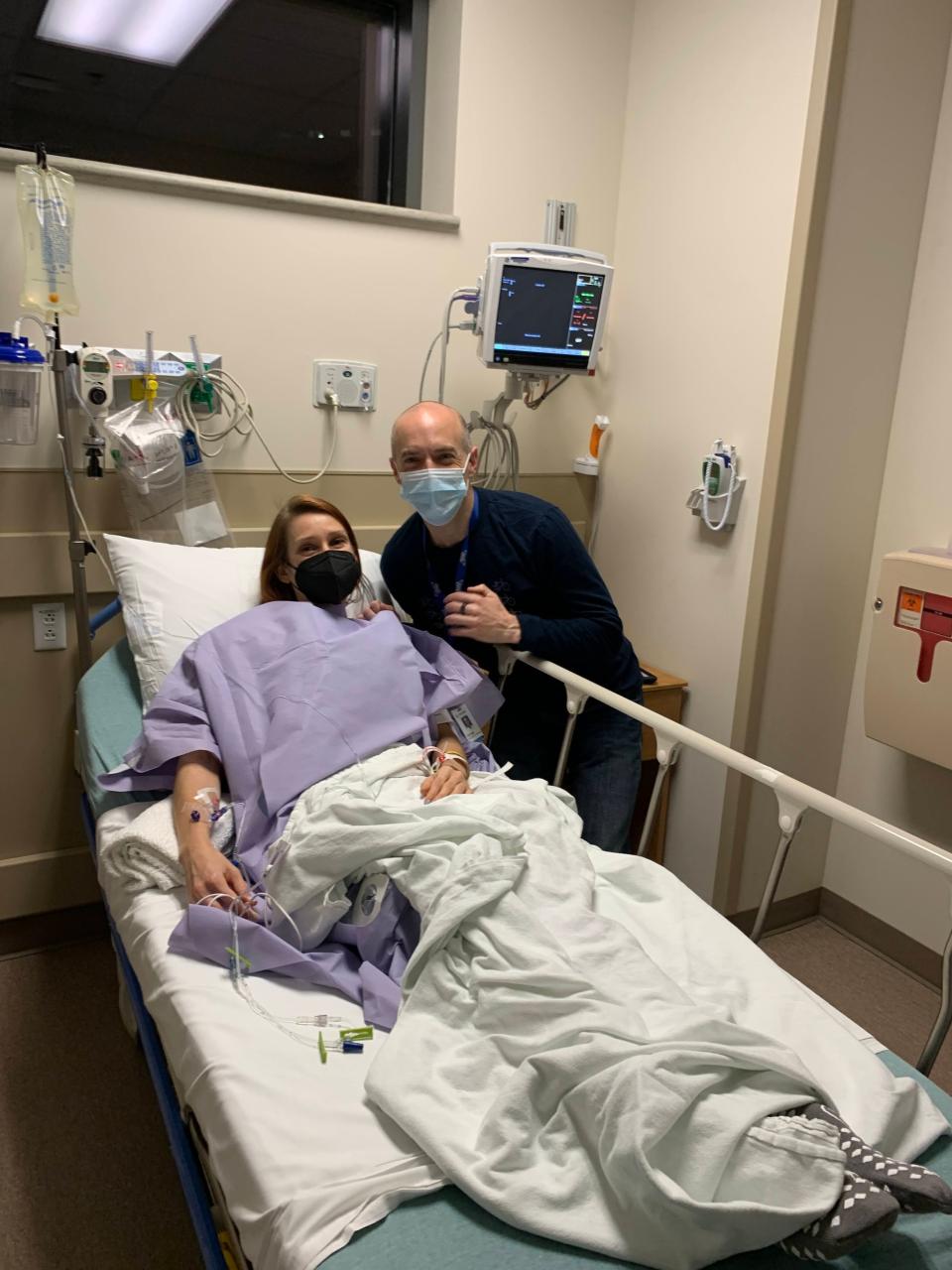
'Buzz and excitement'
Threadgould arrived at Dell Seton by 5 a.m. Thursday. "It's a bit early," she said, but it was like preparing for a race. "There's a lot of buzz and excitement," she said.
As with most surgeries, Threadgould had to get into a gown, answer medical questions, and get an intravenous line started. She also had to give blood. One tube the transplant center will keep on file for 10 years in case there is ever a question about future diseases for the recipient. More tubes will travel with her kidney to the recipient's hospital.
By 5:45 a.m., she was being wheeled into OR 14.
On the way there, staff did an honor walk by lining the hallway and clapping for the donor. Threadgould rang a bell and waved to everyone.
Once Threadgould arrived in the operating room, she was prepared for surgery, placed on her back with her left side elevated to get to her left kidney, the one that would be removed.
The anesthesiologist put her to sleep, and her entire body, except a small section of her abdomen, side and back, is covered in surgical draping.
Turgeon made a 6-centimeter incision in Threadgould's abdomen to work inside as well as small laparoscopic incisions for cameras and tools to enter the abdominal cavity. Threadgould's abdomen was pumped up with gas to expand the area for Turgeon's work.
Turgeon worked with determination. It's physically demanding, but also precise work. In the background was Turgeon's eclectic playlist of music, which runs from Justin Bieber's "Ghost" to Adele's "Rolling in the Deep."
First, Turgeon cut away the connective tissue with scissors that also cauterize the area. Then she carefully identified the renal vein, the renal artery and the ureter. She clamped off the ureter and the vein with two metal clips and cut between the clips.
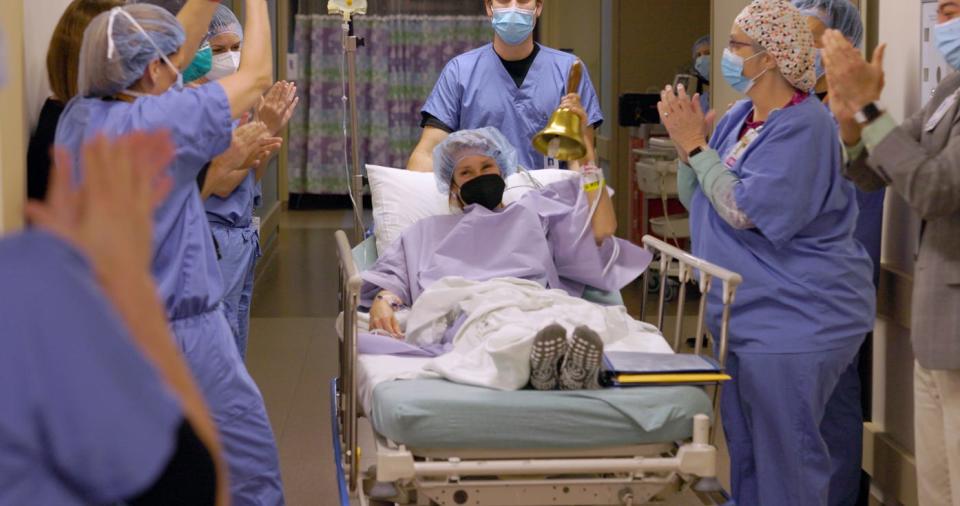
Turgeon called out to turn down the music. She announced she was going to cross clamp, meaning she's going to clamp the artery and cut between the clamps, which stops the blood flow to kidney.
At 7:56 a.m., Turgeon announced the "cross clamp time," which is the time when the kidney is no longer supported by the donor's body. That time will be noted on the paperwork that will accompany the kidney. A kidney can stay out of the body for up to 36 hours, but the sooner it's back inside a body, the better. For a deceased donor, within 24 hours is good. For a living donor, the sooner, the better.
"Kidney's coming out," Turgeon announced. She then pulled it through the small slit in Threadgould's abdomen and put it on a table behind her.
Turgeon then prepared the kidney for travel. A nurse took a picture of the kidney to send to the recipient's surgeon. The team took measurements of everything from the kidney itself to the artery, vein and ureter sections that have been left to attach to the recipient's artery, vein and ureter. Turgeon also cut off any extra fat around the kidney. She checked for any sign of cancer or abnormality.
"This kidney is very healthy," she said. "It's gorgeous."
The kidney was filled with saline to flush out any blood so it won't clot inside the kidney during transport. Then it was packed in a plastic bag filled with saline. The bag went into a plastic cylinder with a twist top. Another bag surrounded that. It was then put inside a garbage bag in an insulated box packed in ice. A GPS tracker, tubes of the donor's blood and paperwork were added to the box. Stickers that read "Human Organ Must Ride" were placed all over the box, along with a special sticker that has more details of where it is going and what's inside.
The kidney was picked up by a courier at 10 a.m. and then placed in the cargo hold of a commercial plane at Austin-Bergstrom International Airport. It was flown to an airport in New York near the recipient's hospital and taken by courier to that hospital.
In the meantime, Turgeon and the surgery team checked Threadgould to make sure there's no excessive bleeding. The instruments and plastic lining that kept the surgical field sterile were removed from Turgeon, and she was stitched up and taken to recovery.
The surgery itself lasted about 90 minutes. The recipient's surgery will be about the same length.
"It was a successful surgery," Turgeon said. Turgeon then goes on rounds to visit Wright and Rainelli, the center's first kidney donor and recipient pair.
Growth of Austin: 'Scary' need for blood with COVID-19 omicron surge, Austin growth outpacing donations
Being the first
Dom Rainelli had just finished his finals last May at Penn State University when he went to see a doctor about migraines he was having. A blood test revealed that his kidneys weren't functioning. He was told to go to the hospital immediately for more tests. He was diagnosed with IgA nephropathy, an autoimmune disease in which the antibody immunoglobulin A builds up in your kidneys.
The migraines were being caused by the high blood pressure that was happening because his kidneys weren't functioning. He probably had kidney disease for four or five years without knowing it.
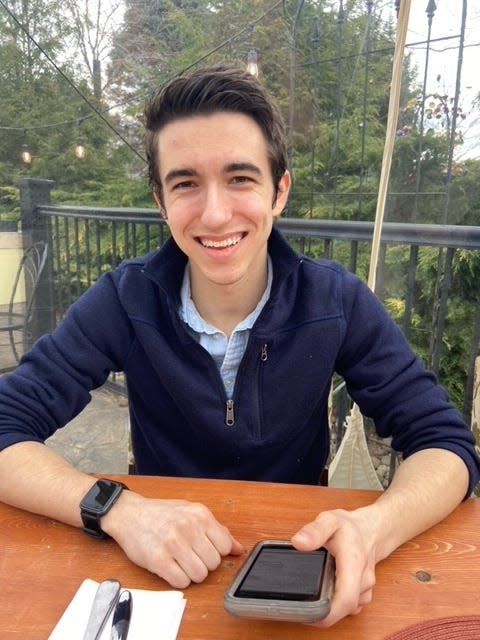
Rainelli and his family began looking for kidney donors. Several people came forward and applied on a website to be Rainelli's donor. His cousin Kayla Wright, who is an Army sergeant first class stationed at Fort Drum in New York, learned about Rainelli's need from her mom.
Rainelli and Wright hadn't seen one another since they were kids, but they knew about each other from their mothers. "Family is family," Wright said.
"If somebody needs something, we are there, no matter what," said Rainelli's mom, Jamie.
Originally, Rainelli was scheduled to get his transplant at a hospital in Pennsylvania. He prepared by taking online classes at Penn State last semester and this semester, so that he could recover from the transplant.
Like Threadgould, Wright went through several rounds of testing. It became clear that she was going to be the best match by November and that she and her kidneys were healthy enough for her to become a donor.
"I had the easy part," she said. "I just had to say, 'Hey, I'll donate.'"
By the end of January, they learned Wright was approved to be his match. By that time, Rainelli was getting worse and would soon need dialysis, but the transplant center in Pennsylvania couldn't schedule the transplant until March or April at the earliest.
Turgeon said that it is better to do kidney transplants before a patient gets to the point of needing dialysis because the transplant outcome is better.
"He absolutely needed the transplant," she said.
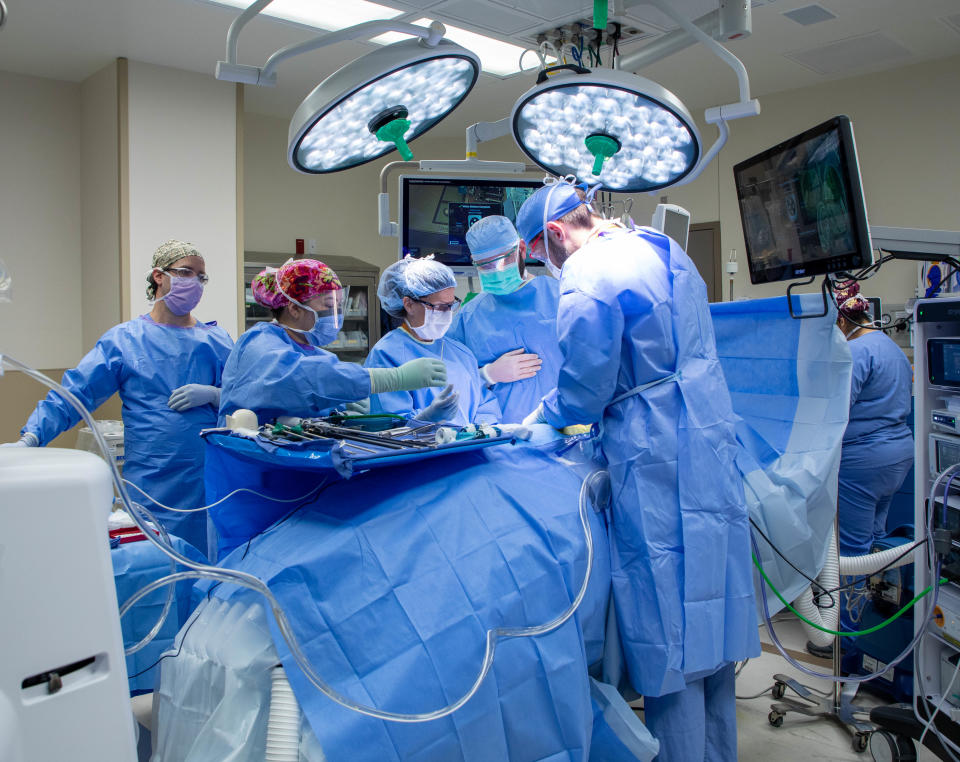
Rainellli grew up in New York, but his family moved to Austin three years ago. His mother works for the University of Texas in student affairs, and people began to point her to Turgeon and the new center.
Turgeon consulted with Rainelli by phone at first, but by Feb. 13, Rainelli and Wright met in the Philadelphia airport and flew to Austin together. It was the first time they had seen each other in more than a decade.
They met with Turgeon the next day, and the transplant was scheduled for the following week.
When Rainelli learned he would be the first kidney transplant at Dell Seton, "I almost freaked out," he said, but then, he thought, "it's not their first surgery as surgeons. ... It's their first surgery here at this facility. I knew they were going to dot their I's and cross their T's."
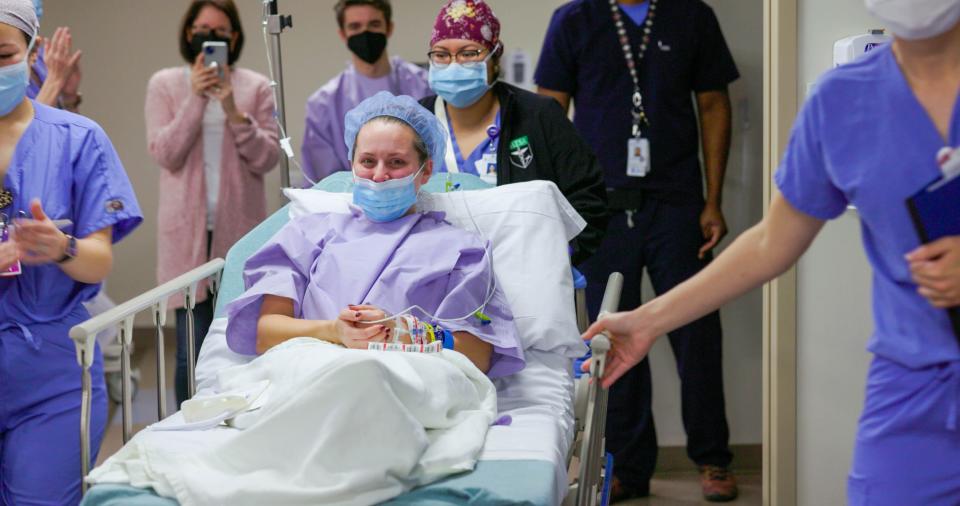
"I can't say enough about the care and the team," Jamie Rainelli said. "They truly cared about both of them as individuals. They wanted the best for them. They were amazing."
Wright said she appreciated the way the team broke down exactly what was going to happen and what her risks might be after the donation. She will need to not get pregnant for the first year after the donation. If she does decide to become pregnant, her doctor will need to closely follow her blood pressure. She also won't be able to do contact sports.
On Feb. 22, the day of the transplant, Rainelli was excited: "This is a life-changing event. She saved my life, simply put. I was also nervous. This is my first major surgery."
Wright said she wasn't nervous, but more excited: "I'm still in disbelief. We did it. I donated a kidney, and Dom is getting better."
More health care coming: 3 new hospitals part of St. David's HealthCare $1 billion Austin-area expansion plan
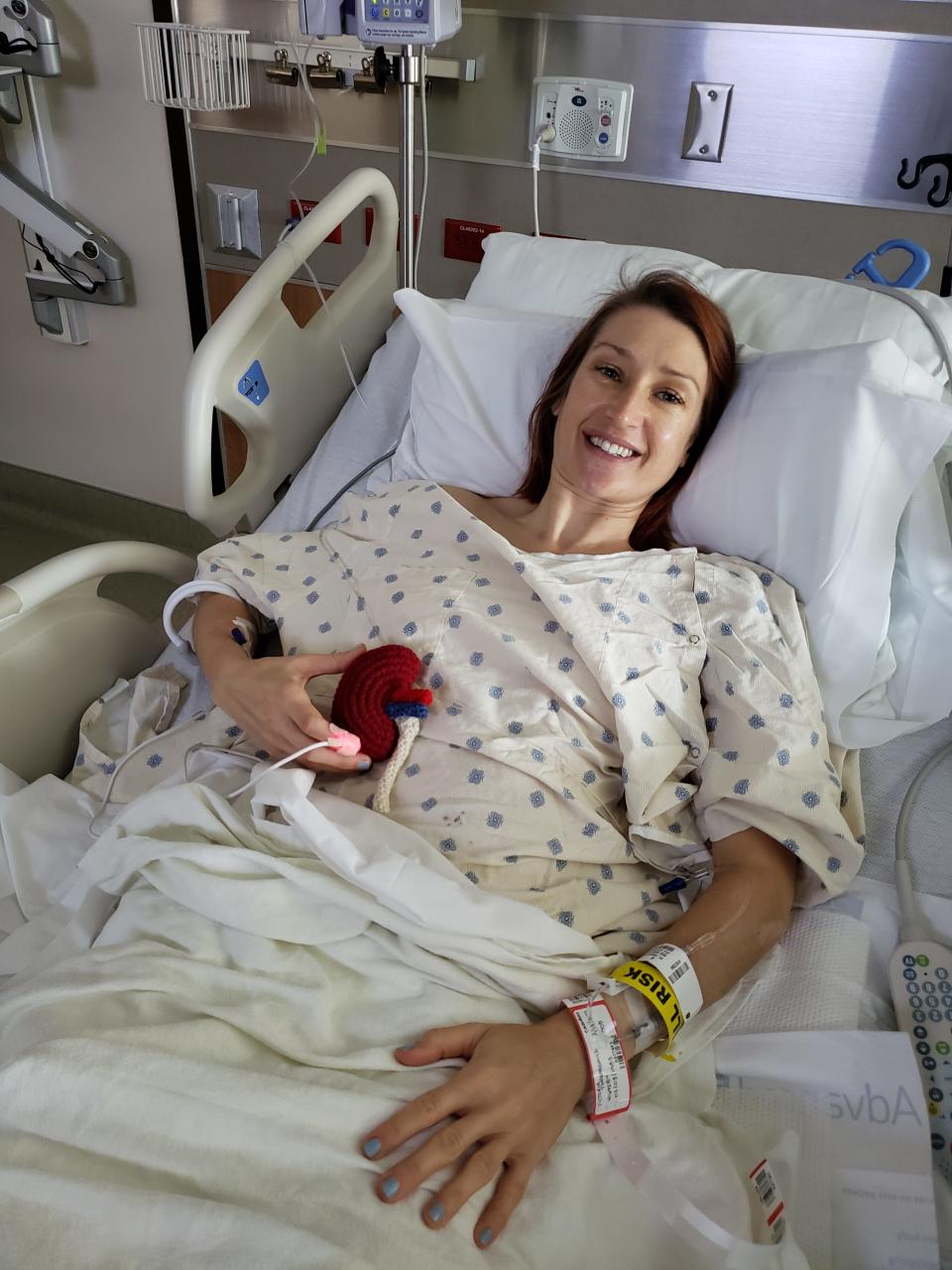
Healing after kidney donation
Threadgould has had some abdominal pain and some shoulder pain, but she's only needed Tylenol since leaving the hospital Saturday. It sometimes hurts when she coughs. She's had some bloating from the gas that was pumped into her abdomen.
She rested for a few days before returning to light work Monday. She helps fundraise for the hospital network's Seton Fund. She'll spend this time of healing reading a good book, enjoying some dark chocolate and making crocheted kidney replicas for the center's staff. If she ever meets her recipient, she plans on giving the recipient a left crocheted kidney, too.
"Apart from the bloating and discomfort ... I'm equally happy knowing my kidney is in New York somewhere," she said.
Wright is sore, and it takes effort to sit up, but she's recovering well. She's been out of the hospital since Thursday. She will stay in Austin until she is cleared to visit her family in Florida, before returning to the Army in six to eight weeks.
Rainelli doesn't remember the first few days of recovery, but said every day he feels better. His blood levels already are much better, and he said he can now stay awake all day with one good kidney, instead of the exhaustion he felt with two bad kidneys.
"Every day, I feel better and better," he said. He was able to leave the hospital on Monday.
Turgeon expects him to feel very different by six weeks, and definitely by three months, he will feel the full effect of a healthy kidney.
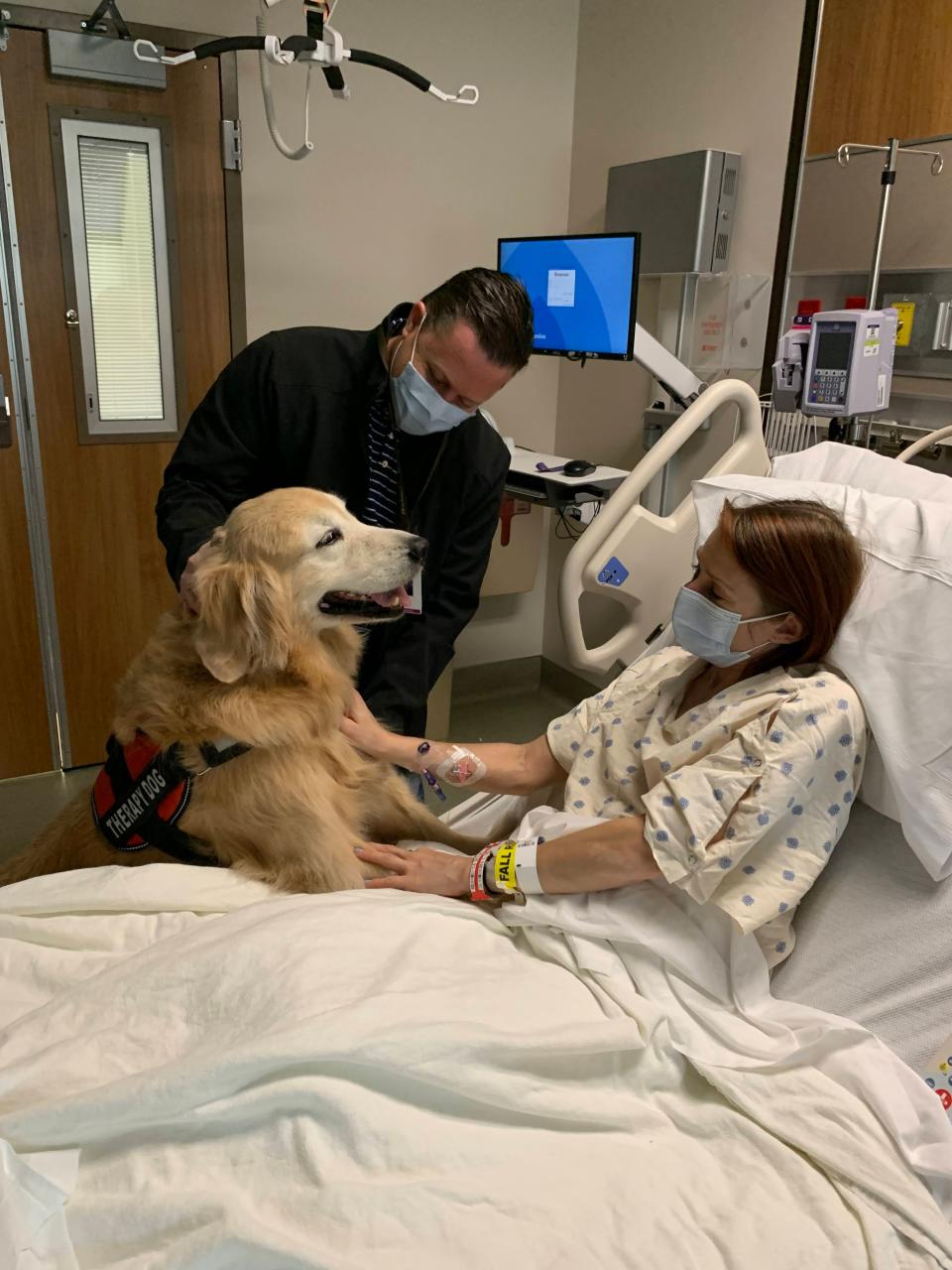
He will stay in Austin but return to Penn State for graduation in May. He plans on finding a job in Austin to be close to his transplant team.
A kidney transplant will last between seven and 20 years. At that point, Rainelli will need another donor. One of goals of people in the transplant field is finding ways to extend the life of a kidney transplant, Turgeon said. Some of the current anti-rejection medications can damage the kidneys long term, she said.
Threadgould says anyone who is interested in being a living kidney donor should contact the National Kidney Registry and do the research. "You can potentially help sustain someone and improve their quality of life," she said.
Both Wright and Rainelli would encourage people to give a kidney if they are able to do it.
"Every year on this day, we'll have a kidney party," he said. "I feel a lot closer to Kayla. She feels like a sister to me. What she did is almost unbelievable."
How to become a living donor
partnersincare.health/abdominal-transplant-center
About this story
Reporter Nicole Villalpando has been covering the growing transplant programs in Austin. She was in the operating room to watch this first nondirected kidney donation at Dell Seton.
This article originally appeared on Austin American-Statesman: Kidney donation, transplants begin at Dell Seton, UT Health Austin

